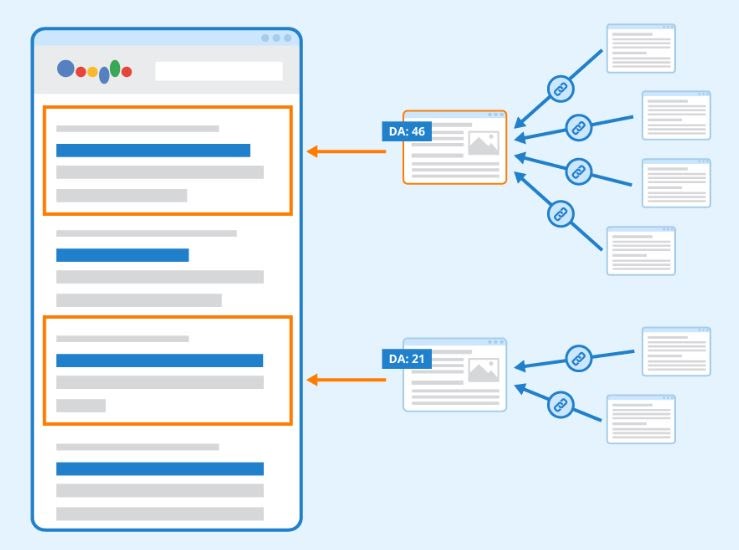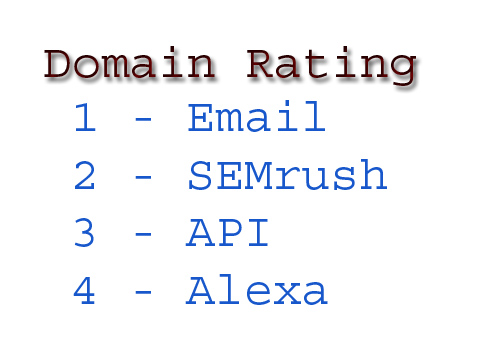In the ever-evolving world of digital marketing, understanding domain metrics is crucial for businesses looking to build a strong online presence. Whether you're an SEO professional, a webmaster, or simply curious about how websites are ranked and evaluated, domain metrics provide insights that can significantly influence your online strategy.
In this article, we’ll dive into the key concepts of domain metrics such as Email Domain Rating, SEMrush Domain Rating, Domain Rating API, Alexa Domain Ranking, and Domain Auction Rates. We’ll explore how these metrics are used, what they signify, and how they can help you enhance your website’s performance.
1. What is Domain Rating?
Domain Rating (DR) is a metric developed by tools like Ahrefs, Moz, and SEMrush to measure the strength of a website’s backlink profile on a scale of 0 to 100. This score helps SEO professionals evaluate the quality and authority of a domain based on factors such as backlinks, referring domains, and overall site structure. A high DR score generally correlates with better rankings on search engine results pages (SERPs). While DR is not a direct ranking factor for Google, it is a valuable indicator of a site's potential authority and credibility.2. Email Domain Rating
Email Domain Rating is a lesser-known but increasingly important metric in the realm of email marketing. It helps email marketers evaluate the credibility and reputation of a domain used for email sending. A high domain rating in this context suggests that your emails are more likely to land in the inbox rather than the spam folder. Factors influencing Email Domain Rating include:- Email deliverability: The rate at which your emails reach the intended inboxes.
- Spam complaints: How often your emails are marked as spam.
- Open rates and engagement: Higher engagement with your emails can positively affect the rating.
3. SEMrush Domain Rating
SEMrush Domain Rating (DR), similar to Ahrefs' metric, evaluates a domain's authority based on its backlink profile and overall SEO performance. SEMrush uses a proprietary algorithm to assess the quantity and quality of backlinks a domain receives. This score is often used by SEO professionals to:- Analyze competitor domains.
- Gauge the SEO strength of their own website.
- Identify potential link-building opportunities.
Key Components of SEMrush Domain Rating:
- Backlinks: The number and quality of external sites linking to your domain.
- Referring domains: How many unique domains are linking to your website.
- Traffic metrics: While not a direct factor in DR, traffic data can often reflect how strong a domain is.
4. Domain Rating API
A Domain Rating API is an automated service that allows developers and businesses to retrieve a website's domain rating and other SEO metrics programmatically. It provides essential data like DR, backlinks, and organic traffic, which can be used for real-time reporting, SEO auditing, and performance tracking. These APIs are highly useful for:- SEO agencies: Automating the process of monitoring client websites.
- Website owners: Tracking their own site's performance without needing to manually check SEO tools.
- Developers: Building custom dashboards that provide domain metrics in real-time.
Benefits of Using a Domain Rating API:
- Automation: Saves time by automatically fetching up-to-date domain metrics.
- Accuracy: Provides real-time data for precise SEO strategy adjustments.
- Customization: You can tailor the API to your specific needs, such as tracking competitors or monitoring multiple domains.
5. Alexa Domain Ranking
Alexa Domain Ranking, developed by Amazon’s Alexa Internet, is a metric that ranks websites globally and by country based on their traffic and user engagement. The lower the Alexa rank, the higher the traffic. For instance, Google.com is often ranked as #1 globally due to its massive daily traffic. Alexa rank is not directly related to a site's SEO performance, but it is a good indicator of how popular a website is compared to others.How Alexa Domain Ranking is Calculated:
- Traffic data: Alexa pulls data from users of their browser extension as well as other sources to estimate the number of visitors to a website.
- Engagement: The amount of time users spend on the site and the number of pages they visit during a session.
Why Alexa Domain Ranking Matters:
- Benchmarking: It helps you see where your website stands globally or within a particular country.
- Competitive analysis: You can use Alexa rank to compare your website's popularity to that of your competitors.
6. Domain Auction Rates
Domain Auction Rates refer to the value of domains being sold in online auctions. Domain auctions are platforms where website owners can buy and sell domain names, often based on how valuable or brandable the domain is perceived to be. Several factors influence the auction price of a domain, including:- Domain authority: High DR domains with existing backlinks and traffic tend to fetch higher prices.
- Keyword relevance: Domains with industry-specific keywords can be more valuable.
- Length and brandability: Short, catchy, and easy-to-remember domains often sell at a premium.
Key Factors That Influence Domain Auction Rates:
- TLD (Top-Level Domain): Certain TLDs like .com and .org are often more valuable than others like .biz or .info.
- Historical traffic: Domains with a history of high traffic are more attractive to buyers.
- Search engine rankings: Domains that rank well on search engines or have a history of doing so tend to be more valuable.


